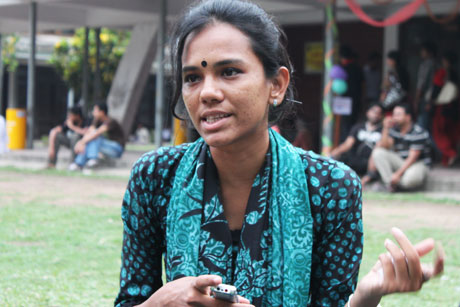Speaking up: Bangladeshi youth challenge violence against women
Date:

When twenty-one- year- old Junanjina Ahmed Trina speaks, people have to listen. As the winner of the nationwide Violence Against Women Debate held by UN Women in Bangladesh, young Junanjina held her ground in the face of hundreds of competitors. What gave her this winning edge?
Perhaps, it was her admirable record of winning debating championships ever since she was a school girl. She has won debating championships organised by UN Women as well as Stanford University in the past. A student of Anthropology, Junanjina works in the Research and Learning section of BBC Media Action.
The debate organised UN Women Bangladesh Debate Federation and Gati Media Ltd was held in Chittagong, Sylhet, Rajshahi, Rangpur, Dhaka Metropolitan, Barishal, Faridpur and Khulna. People turned up in large numbers to raise their voices against this injustice. As a sign of support, universities across the nation opened their doors. While 256 male and female students participated in the debates, more than 200 students volunteered to organise the debates.
Each venue was packed with over 300 students, teachers and staff, with each participant speaking with ardent passion. The event was unique for two reasons. Firstly, it increased awareness among the youth, many of whom did not have a concrete idea about violence against women. Secondly, each person who attended or participated carried the message of the debate into the cities, towns and villages of the country.
“The event challenged the youth of the country to envision a better tomorrow and to discuss how they could free these women from violence. They analysed the significance of women in a capitalist economy and explored how the women stood to gain from such an arrangement. An extensive range of topics, ranging from the role of the state to economic and political empowerment of women to the redundancy of the quota system, were discussed and debated with enthusiasm,” explains Naheed M. Ahmed, National Programme Manager, UN Women Bangladesh Programme Office.
The overwhelming response from this debate has encouraged UN Women to organise more events like this in the future. UN Women hopes that the spark created by this debate will light up many minds.